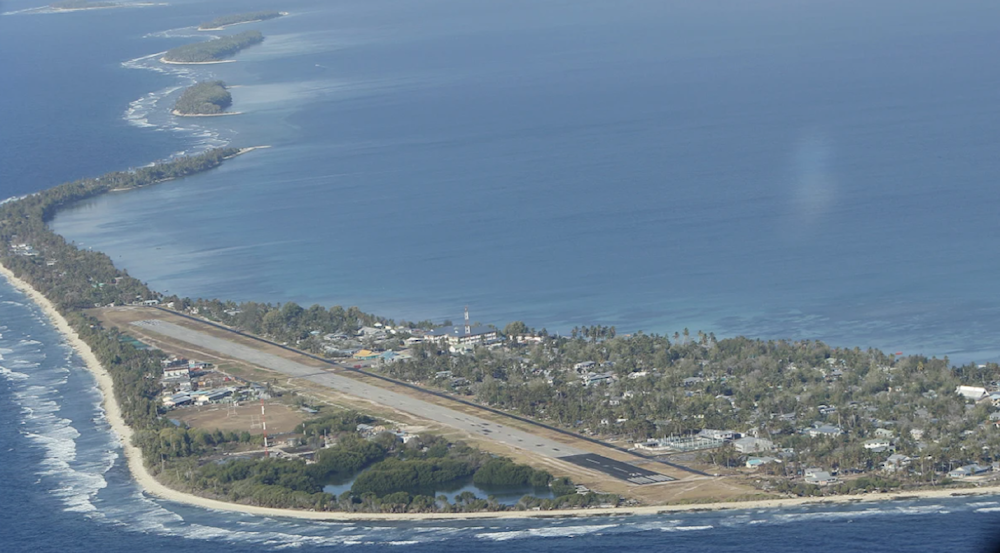Pacific islands accuse Australia of 'exporting climate destruction'
At COP29 in Baku, Pacific nations criticized Australia's plans to expand its fossil fuel sector, warning that emissions from projects like the North West Shelf gas facility would far exceed their own, and urged Australia to prioritize climate action over fossil fuel development.
-

Funafuti, the main island of the nation state of Tuvalu is photographed on January 26, 2024. (AP)
Pacific states partaking in a UN climate meeting are criticizing Australia's plans for a large gas sector development plan in Western Australia, claiming it will result in 125 times more greenhouse gas emissions than their island nations emit in a year.
As the COP29 conference in Baku, Azerbaijan, enters its second week, officials from Vanuatu and Tuvalu have urged Australia to end the authorization of new fossil fuel initiatives, including a plan to prolong the life of Woodside's North West Shelf gas facility until 2070.
Vanuatu’s climate envoy, Ralph Regenvanu, accused Australia of "not acting in good faith" by claiming climate leadership while approving coal and gas projects, calling it "climate injustice" as Australia exports fossil fuels that exacerbate the climate crisis in Pacific nations like Vanuatu.
Regenvanu urged Australia to support the transition away from fossil fuels, while Tuvalu’s Maina Talia emphasized that limiting global warming to 1.5°C is crucial for Pacific communities facing rising seas and extreme weather, holding industrialized nations accountable for their actions.
"Our future lies solely in their hands," said Talia.
Australia's Climate Minister Chris Bowen is co-leading key negotiations at COP29 to establish a global climate financing goal of $1 trillion per year by 2030 and is advocating for Australia to co-host the COP31 summit in 2026 with Pacific countries. Pacific leaders support this bid but stress that it must prioritize stronger emissions reductions and address Australia’s fossil fuel exports, increasing pressure on the country to align its climate policies with its global commitments.
Australia is competing with Turkiye to host COP31 in 2026, with Climate Minister Chris Bowen negotiating in Ankara to secure support. Pacific leaders back Australia’s bid but stress that any successful co-hosting agreement must include a commitment to end new fossil fuel projects, with Tuvalu’s Maina Talia calling for a rapid phase-out of coal and gas to ensure effective climate action.
Speaking in Azerbaijan, Talia stated a "Pacific Cop" as it is being referred to, would be "an exciting opportunity to accelerate ambitious climate action in our region," but "a commitment to end new fossil fuels must lie at the heart of this." "That means no new coal and gas, and a fair, fast phase-out of all fossil fuels," Talia said.
Australian climate commitments 'insufficient'
Activists warn that emissions from the Burrup Hub gas facility could reach 6 billion tons, while the expansion of three coal mines could add over a billion tons more.
Bowen said Australia’s best environmental impact would be transitioning to renewable energy exports, aiming to become a "renewable energy superpower," but warned that halting fossil fuel exports prematurely, before substitutes are available, wouldn't work.
The Australian government announced a $125 million investment to enhance energy security and grid transformation in the Pacific, with Climate Minister Bowen stressing the importance of working with Pacific nations on climate action.
However, a recent Climate Action Tracker report criticized Australia's climate commitments as "insufficient" and its financial contributions as "critically insufficient," noting that while Australia promotes renewable energy investment, it continues to increase reliance on fossil fuels, leading to stagnant emissions.
Bill Hare of Climate Action Tracker stated that emissions from fossil fuels in the nation were "flatlining," but this was obscured by revisions in government estimates of forest emissions.
According to Shiva Gounden of Greenpeace Australia Pacific, Australia will "be judged by its actions, not its words".

 4 Min Read
4 Min Read









